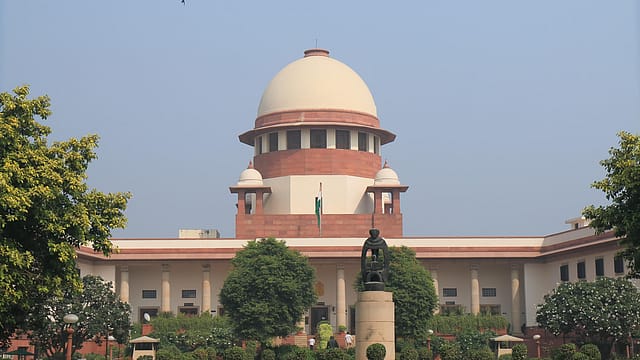Supreme Court upholds validity of Aadhaar
ADVERTISEMENT

In recent times no other subject has perhaps split the nation more than the debate on Aadhaar and its validity. As with any contentious issue, the matter was left to the Constitution Bench of the Supreme Court. After a marathon hearing spanning 38 days over four and half months, the longest ever in the history of the apex court, the five-judge bench could not come to a unanimous decision.
But ultimately, as with most disputes the majority won. With four out of five judges on the Constitution Bench upholding the constitutional validity of Aadhaar and the Aadhaar (Targeted Delivery of Financial and Other Subsidies, Benefits and Services) Act, 2016, the unique identity is here to stay. The judges who upheld the validity of Aadhaar were Justice A K Sikri, Chief Justice Dipak Misra, Justice A M Khanwilkar and Justice Ashok Bhushan. Justice D Y Chandrachud, who was also part of the apex court bench that ruled privacy is a constitutionally protected right, last year, and opened the can of worms, was the dissenting member.
The sum and substance of the mammoth 1,448 page verdict, split into three parts, is that Aadhaar does not violate the right to privacy, there are enough provisions to protect data and the Aadhaar Act was passed through provisions within the constitution. While the verdict allows for Aadhaar to be made mandatory for social welfare schemes and benefits which draw money from the Consolidated Fund of India, it puts a stop to private banks, insurance firms and even telecom firms requiring Aadhaar to provide their services. Aadhaar cannot be made mandatory by Central Board of Secondary Education, National Eligibility cum Entrance Test (NEET), Joint Entrance Examination or University Grants Commission. However, the judgement also ruled that Aadhaar linking with Permanent Account Number (PAN) will remain mandatory.
January 2026
Netflix, which has been in India for a decade, has successfully struck a balance between high-class premium content and pricing that attracts a range of customers. Find out how the U.S. streaming giant evolved in India, plus an exclusive interview with CEO Ted Sarandos. Also read about the Best Investments for 2026, and how rising growth and easing inflation will come in handy for finance minister Nirmala Sitharaman as she prepares Budget 2026.
The first part of the verdict, which was written by Justice A K Sikri and signed by Chief Justice Dipak Misra and Justice A M Khanwilkar, stated that Aadhaar is meant to help benefits reach the marginalised sections of the society, and takes into account the dignity of people not only from personal but also from community point of view.
Justice Sikri wrote, “Enrolment for Aadhaar card also requires giving of demographic information as well as biometric information which is in the form of iris and fingerprints. This process eliminates any chance of duplication.”
Justice Ashok Bhushan gave his opinion in a separate verdict but concurred with the majority judgement. He wrote that the government and the Unique Identification Authority of India were empowered to cure the defects in the Aadhaar scheme and the Aadhaar Act does not create a framework for surveillance. Justice Bhushan also said that no material was placed before the Supreme Court to indicate that there has been a considerable denial of social benefits to deserving people.
Justice D Y Chandrachud in his verdict stated that the Aadhaar Act could not have been passed as Money Bill. "Bypassing the Rajya Sabha to pass the Aadhaar Act amounted to subterfuge and the law was liable to be struck down as being violative of Article 110 of the Constitution," he ruled. Article 110 has specific grounds for Money Bill and the Aadhaar law went beyond this, Justice Chandrachud said, adding that in the current form, the Act cannot be held to be constitutional.
The biometric data based unique identity, was the brainchild of the Congress-led United Progressive Alliance (UPA) government but its widespread use and legal sanctity was provided for by Prime Minister Narendra Modi-led National Democratic Alliance (NDA) government. Yet, the two political camps have not seen eye-to-eye on the widespread implementation of Aadhaar. Both sides claimed moral victory on Thursday.
“The majority judgment in the Aadhaar case has retrieved the UPA's original idea of Aadhaar. Aadhaar was meant to be a benign instrument to deliver benefits, subsidies and services to the poor. Glad that the UPA's policy has been vindicated. The NDA tried to convert Aadhaar into a monster that will rule every aspect of a person's life. And the NDA had been firmly rebuffed,” P Chidambaram, senior leader of the Congress and former Finance Minister said on Twitter.
Responding to the verdict, Finance Minister Arun Jaitley said after a cabinet meeting, “Technology as a tool of governance, as an instrument of conferring benefits to people, as an instrument of revenue collection, I think is a concept which nobody now really can deny and the Supreme Court after reviewing this [Aadhaar], has held this to be constitutionally valid. In no field, can we afford to be a technology laggard.”
Lawyers and consultants also welcomed the verdict stating that it brings clarity to the use of Aadhaar. “This judgement will help minimise the uncertainties regarding Aadhaar usage considerably. It provides reasonable restrictions to ensure citizen consent is taken and misuse of data can be controlled, while benefits of Aadhaar can be adequately passed on to marginalised groups,” said Neel Ratan, partner & leader, government & public sector, PwC India.
Gopal Bohra, partner at N. A Shah Associates said that the judgement will set the guidelines on various ongoing controversial areas where use of Aadhaar was made mandatory. “The Apex Court has applied balanced approach making mandatory use of Aadhaar at certain places such as filing of income tax return atleast for those individuals who are eligible to obtain Aadhaar and also restricting the data sharing private parties,” he added.
(With Inputs from Arnika Thakur and Aveek Datta)
